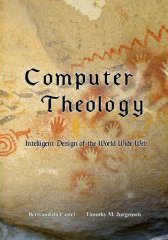"if
one engages in an interaction with a red chameleon, it is only fair that all
parties know that chameleons are involved and that chameleons can change colors
with great alacrity" |
PRESS
COMPUTER THEOLOGY |
||||
|
Of course, one
might well wonder whether such a history is of benefit to a person and to the
social order, or is it in fact a threat. On the benefit side of this
consideration, under such a comprehensive identification system the contained
information has a high probability of being correct, and therefore worthy of
trust. In addition, within a system grounded in strong authentication of
differential identity, it becomes trivial to require an anchored persona for
anyone who seeks to access this record. It is technically possible to forbid
all anonymous access to the Book of Life. Indeed, within such an environment,
anonymity on the part of any requestor becomes a threat, whether by hacker or
by authority. Globally, there are obviously details of experiential identity on
the part of an individual that are the proper concern of the full social order;
records of criminal conviction for example. Individually, we often seek
interaction benefits based on our reputation, and the Book of Life provides
this. However, in the quest for privacy, sometimes we would like to
compartmentalize our reputation just a bit. Two other facets of identity that
we discussed in Chapter 9 allow us to do this: the floating persona and the situational
persona. Since the public
key infrastructure allows for the creation of a hierarchy of trusted third
parties, we have the capability to establish subordinate archives of
experiential identity. We could, for example, establish a Book of Aliases. With
this facility, through our personal transcendent personal device we can
establish a digital persona associated with a floating persona, in other words
a name of our own choosing. The Book of Aliases could then invoke within our
transcendent personal device the creation of a key pair, with the private key
protected by our differential identity marker and the public key exported to
the Book of Aliases. Within the Book of Aliases, a digital certificate could be
issued that would associate the name we had selected with the public key from
our transcendent personal device. A copy of this digital certificate could then
be loaded onto our device. Now, through our transcendent personal device, we
are able to engage in a transaction with some other entity through a floating
persona. The other party can thus know the limitations on experiential identity
acquired through this facet of identity of an individual. In essence, the
record of experiential identity established in the Book of Aliases is highly
trusted to refer to the same biophysical person, but there is not a direct
connection to the differential identity of that person. This looks like our
credit history as currently maintained by various credit bureaus, with a couple
of new wrinkles. First, the information contained in the Book of Aliases is
much more likely to be correct than the information found within a person’s
credit history. Moreover, the information in the Book of Aliases is much more
likely to all refer to the same biophysical person than is the information
within a person’s credit history. Finally, a level of privacy is formally
enforced, as the information is not indexed on the actual name of the person. Now, in certain situations, we would like to engage in interactions where the only record maintained is what is remembered by ourselves or the other party. Moreover, we may not choose to disclose our “true identity” in such situations. This is the interaction of the situational persona; the “What happens in Vegas, stays in Vegas!” style of interaction. However, if one engages in an interaction with a red chameleon, it is only fair that all parties know that chameleons are involved and that chameleons can change colors with great alacrity. So, to engage in such interactions on the Web, it would be most useful if our transcendent personal device can establish a situational persona for us. In fact, this is rather straightforward since it does not involve a trusted third party at all. In this case, the device simply generates a digital persona; a name and a public and private key pair. The device then creates a digital certificate that associates the name with the public key, and then signs it with the private key. When this digital certificate is given to some other party in advance of an interaction, that party can authenticate the digital differential identity across the Web. Hence, an ongoing interaction can be maintained if desired. However, the other party knows from the form of the digital certificate that this is a situational persona it is interacting with. |
||||
|
||||
© Midori Press, LLC, 2008. All rights reserved for all countries. (Inquiries) The contents of Computer Theology: Intelligent Design of the World Wide Web are presented for the sole purpose of on-line reading to allow the reader to determine whether to purchase the book. Reproduction and other derivative works are expressly forbidden without the written consent of Midori Press. Legal deposit with the US Library of Congress 1-33735636, 2007.
|
Computer Theology Intelligent Design of the World Wide Web Bertrand du Castel and Timothy M. Jurgensen Midori Press, Austin Texas 1st Edition 2008 (468 pp) ISBN 0-9801821-1-5 |
Book available at Midori Press (regular) |
